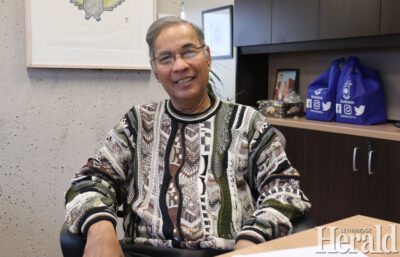U of L president looks back on 2024
By Al Beeber - Lethbridge Herald on January 4, 2025.
 Herald photo by Al Beeber
For University of Lethbridge president Digvir Jayas, 2024 was a year of accomplishments.
Herald photo by Al Beeber
For University of Lethbridge president Digvir Jayas, 2024 was a year of accomplishments.LETHBRIDGE HERALDabeeber@lethbridgeherald.com
For University of Lethbridge president Digvir Jayas, 2024 was a year of accomplishments.
The announcement of the rural medicine training program and other initiatives made the year a strong one for the university.
The Southern Alberta Medical Program, or SAMP, at the U of L was announced earlier this year.
“We thank the province for providing the financial support and we have signed an MOU with the University of Calgary” and Dr. Richard Buck was named regional lead for the program, Jayas said in a recent interview.
Jayas calls Buck “a superb person” to lead the program.
The U of L also has identified a project manager for the infrastructure that will be needed for the program.
And the university will be working with southern Alberta doctors to act as pre-ceptors, the president said.
The program will give the university a national focus, he believes.
“Medical training so far has been limited mostly in Canada to major urban centres so this is an innovative program,” but the U of L is not the only such institution to offer one like it, he says.
Students will be doing their residencies in southern Alberta and the likelihood of them staying in the region increases significantly because of that, previous experience at other universities show.
“It has a potential to lure a lot of practising physicians to the community and to the region,” Jayas says.
“We are committed to recruiting local, training local and then retaining local. So hopefully the students from southern Alberta who want to do medical, and particularly the family physician program” they will see the program as an excellent opportunity to train close to home and practice close to home, he says.
The U of L is also working with the Blood Tribe Department of Health in a collaborative effort which is a multi-phased approach to enhancing the health and well-being of the Kainai Nation. The aim of the project in its first two phases is to build upon the existing Kainai Health Services plan from 2016 to 2025 to identify or reconfirm the health needs and resources for the Blood Tribe over the next 10 to 12 years.
“Once we identify the needs of what kind of health care workers are needed, then we will work with the post-secondary institutions in the region to create unique training programs” to fit those needs,” he said.
The U of L is a liberal arts institution which has a holistic approach to development of students who develop critical thinking skills and learn to work in teams. They learn strong communication skills, both oral and written and bring a multi-disciplinary perspective to problem solving. They also work on complex problems and suggest solutions.
The university, says Jayas, believes the approach it takes to this holistic development makes adaptive workforce of the future.
“With the changing technology and changing societal needs,” being in the same job for decades is not common anymore.
“So the students have to have the commitment to lifelong learning,” he says.
Another highlight for Jayas was the decision by the U of L to waive the application fees of any Indigenous student applying for admission.
“It was seen as one of the barriers for them to submit their application so we have removed that financial barrier for participation in a university education.”
And to continue supporting its commitment to the TRC calls for action and reconciliation, members of the Blackfeet nation in Montana who come to the U of L can attend as domestic students rather than pay international fees.
The university also announced plans for development of its south campus. The campus comprises 100 acres between the main campus of the U of L and Riverstone Boulevard between University Drive and the coulees.
The University of Lethbridge Business Corporation, which operates at an arms length from the U of L under its own board of governors, is working to lead land development and manage properties on the school campus. All profits earned by the corporation will go to the U of L.
The south campus land, says the ULBC, isn’t necessary for academic or research pursuits of the U of L which is conducting a market analysis project to guide development of the space.
“That development basically would generate revenue for the university” in the future, he said, and would provide such things as affordable housing for students and employment opportunities.
Jayas is the university’s seventh president and vice-chancellor.
28-27




